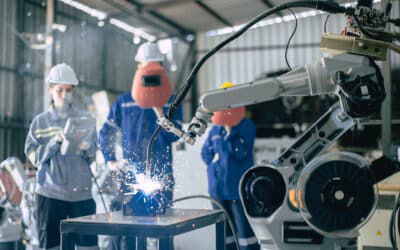Re-industrialization in France has been at the heart of economic debate for several years now. In an
The context: between deindustrialization and the desire to win back the industry
France is facing several decades of deindustrialization, which has weakened its productive fabric and affected thousands of industrial jobs. Despite public initiatives and investment in innovation, the situation remains worrying: many industrial sectors are struggling to maintain their competitiveness in the face of low-cost countries.
This situation raises questions of economic sovereignty and regional resilience. How can we reverse the trend? How can we enable French manufacturers to remain competitive without waiting for the macroeconomic context to improve?
The real driving force behind reindustrialization: the economic equation
Why do some factories stay in France while others relocate? The answer lies in a simple equation: if producing in France costs as much or less, with more added value, than producing elsewhere, manufacturers will stay.
The problem is that this equation is largely based on exogenous factors – labor costs, energy prices, the richness of the local industrial ecosystem – over which manufacturers have little control. These levers largely depend on public policy: social charges, electricity prices, structuring of sectors.
As François Coulloudon points out, “Re-industrialization is not a matter of economic patriotism, but of competitiveness.”
But in the absence of strong structural reforms, which are still rare, waiting is tantamount to enduring. That’s why we urgently need to focus on what each company can control.
Focus on endogenous factors: efficiency and execution
Herein lies the real challenge of competitiveness for French industry: to act on endogenous factors, those over which the company has direct control.
Intelligent digital transformation
The transition to a digitalized industry is no longer an option, it’s a necessity. In concrete terms, this means deploying simple, accessible digitization tools to achieve rapid productivity gains. Measure the OEE (Overall Equipment Effectiveness), identify hidden losses, understand where the margins for improvement lie.
Advanced data processing
Then go further: exploit the accumulated data with advanced analytics solutions, including Machine Learning, to derive actionable insights. Many manufacturers collect large volumes of data, but struggle to transform it into operational decisions.
Competitive execution excellence
But as François Coulloudon points out: “Digitalization alone is not enough: you also need to know how to use it better than your competitors, especially those in low-cost countries who also have access to it.”
Competitive advantage lies not in the technology itself – available to all – but in the ability to exploit it methodically, quickly and efficiently. It is this excellence of execution that makes the difference between a plant that remains competitive and one that closes.
Evidence from the field: French factories saved by performance
Concrete examples exist, even if they often remain confidential, particularly in the world of private equity. TEEPTRAK has worked with a number of French factories on the verge of collapse, in various industrial sectors.
Measurable gains, immediate impact
By deploying simple performance measurement tools such as OEE, these sites were able to reveal unsuspected margins for improvement. Gaining a few points in productivity was enough to reverse the economic equation, justifying the maintenance of activities in France and the preservation of local jobs.
These are small, high-impact gains that enable us to break out of the vicious circle of declining competitiveness, shrinking margins, inability to invest, and then closure.
Act before it’s too late
The risk for many industrial sites is to wait too long. Breaking this cycle is possible, but it requires us to voluntarily take control of our performance, without waiting for the context to improve on its own.
TEEPTRAK’s role in industrial competitiveness
To meet these challenges, TeepTrak offers a pragmatic, results-oriented approach.
Modular solutions for rapid deployment
Our solutions provide a clear vision of industrial performance and identify concrete levers for improvement. The aim: to move rapidly from data collection to operational action.
An advanced analysis platform
Our platform, based on Machine Learning, supports manufacturers who have a lot of data but are struggling to exploit it effectively. Technological innovation at the service of operational efficiency.
A conviction: excellence of execution
Our conviction is simple: in France as elsewhere, reindustrialization requires excellence in the use of technology. It’s not the tool that makes the difference, it’s how you use it.
Reclaiming control over performance: a strategic imperative
François Coulloudon’s message to French manufacturers is clear: “The tools exist, the solutions are within our grasp, we just need to deploy them intelligently and quickly. It’s the decisions taken today, however modest, that will make the difference tomorrow.”
Stop waiting, start acting
Re-industrialization in France will not be achieved through economic patriotism, but through competitiveness. And this competitiveness requires action, not waiting for public policies or favorable contexts.
Manufacturers are the actors of their future. The context is difficult, it’s true, but the means to act exist. Rapidly evolving measurement and analysis technologies offer concrete opportunities for improvement.
Take action with TEEPTRAK
Would you like to measure your potential for improvement and regain control of your performance?
Discover TEEPTRAK in demo and talk to our experts about your industrial performance challenges.
FAQ : Reindustrialization and Industrial Performance
What is reindustrialization in France?
Reindustrialization refers to the process of revitalizing industrial activity in France after several decades of deindustrialization. Its aim is to restore the competitiveness of French production sites and preserve local industrial jobs.
How can manufacturers improve their competitiveness without waiting for reforms?
Manufacturers can act on their endogenous factors: operational efficiency, digitalization of workshops, performance measurement (TRS/OEE), and intelligent use of data. These levers are under their direct control, and generate rapid results.
What is OEE and why is it important?
OEE (Overall Equipment Effectiveness) measures the efficiency of production equipment. It can be used to identify hidden losses and margins for improvement. Gaining a few points in OEE can be enough to turn around the economic equation of an industrial site.
Which industrial sectors can benefit from digitalization?
All manufacturing sectors can improve their performance thanks to digitalization: automotive, agri-food, aeronautics, industrial equipment, plastics, etc. Solutions like TeepTrak adapt to different production environments.
How long does it take to see results with industrial performance tools?
The first productivity gains can be seen within a few weeks of deploying performance measurement tools. The key is to act quickly, with modular solutions that are easy to implement.
Is digitalization enough to stay competitive?
No, digitalization alone is not enough. You have to know how to use these tools better than your competitors. Excellence of execution in the use of technology makes the difference, not the technology itself.





0 Comments